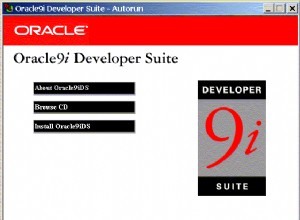1.Se hai solo bisogno di un sql in postgres, eccolo qui:
select * from events
order by (case state
when 'scheduled' then 1
when 'notified' then 2
when 'invited' then 3
when 'started' then 4
when 'ended' then 5
end)
puoi cambiare l'ordine degli stati in sql, non c'è bisogno di cambiare il codice ruby, suonare il violino sql:https://sqlfiddle.com/#!12/976e9/3 .
2. Nel suggerimento di mu, puoi usare un tipo enum, è più efficiente, se hai bisogno di cambiare l'ordine, puoi ricreare l'enumerazione. guarda questo violino sql:https://sqlfiddle.com/#!12/f6f3d/2
CREATE TYPE states AS ENUM ('invited', 'scheduled', 'notified', 'started', 'ended');
create table events(
name varchar(100),
state states
);
select * from events order by state;
3.In puro rubino, puoi definire un hash:
test_hash = {'scheduled'=>1, 'notified'=>2, 'invited'=>3, 'started'=>4, 'ended'=>5}
Events.all.sort! {|x, y| test_hash[x.state] <=> test_hash[y.state]}
4.Ma a mio parere, dovresti aggiungere una tabella denominata "stati", con le colonne "nome" e "sequenza", e specificare l'ordine in "sequenza". Unisciti agli "eventi" e agli "stati" allora. Quando modifichi l'ordine, non è necessario modificare il codice.




